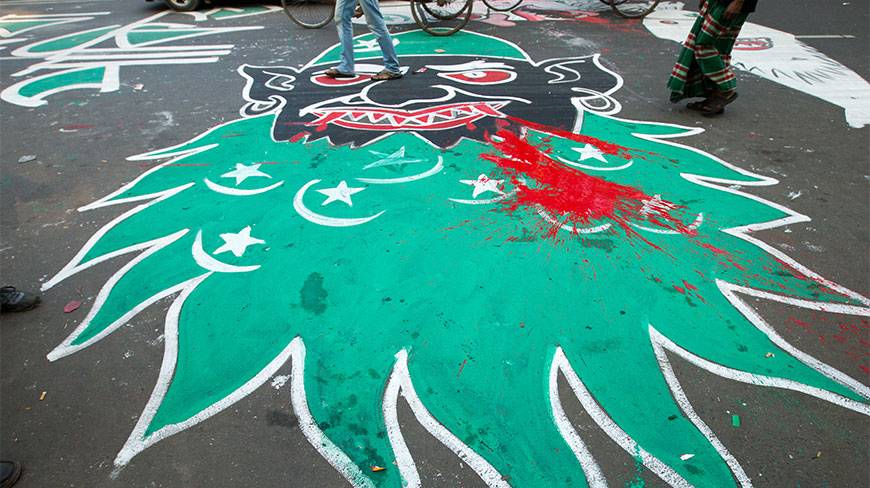Tanvir Haider Chaudhury
Azam went to his grave thinking his choices were the right ones
“Oh, but you who philosophise disgrace and criticise all fears / Bury the rag deep in your face / For now’s the time for your tears.” – Bob Dylan, The Lonesome Death of Hattie Carroll.
By now, all the drama surrounding Ghulam Azam’s namaz-e-janaza and burial is over and done with. The last rites were performed at our national mosque, attended by many of his admirers, and he lies in eternal rest at his family graveyard in Moghbazar. There are reports of someone throwing a sandal at his coffin somewhere along the way, but that would possibly have been a small hiccup in a ceremony performed for the most part with the gravitas such an event demands.
Mr Azam would have been 92 in November 7. That, by any measure, is a long life, in which he achieved many of the things he set out to. He held high office in his chosen area, serving as general secretary of Jamaat-e-Islami in the erstwhile East Pakistan and then Nayeb-e-Ameer of the same party in the sovereign state of Bangladesh, in an unofficial capacity to begin with, from his return to the country in 1978 to 1991, and then officially from 1991 to 2000.
But it is also what he failed at that defines Mr Azam’s career. In 1971, he did his utmost to ensure the liberation movement led by the Mukti Bahini – freedom fighters – that led to the formation of Bangladesh did not succeed. He was instrumental in forming the razakar paramilitary force and the al-Badr militia, forces which worked hand-in-hand with the West Pakistani military in their campaign of murder, rape, arson, and looting throughout East Pakistan, all to stop the East Pakistani Awami League, who had legitimately won the 1970 general elections, coming to power.
He was a true believer, our Mr Azam. He didn’t stop his anti-Bangladesh activities after the country’s independence. He kept at it until 1978, the time of his return to the country under a Pakistani passport, after Bangladesh’s political landscape had been drastically altered. From ’72 to ’78, based out of Pakistan, he organised committees and parties and took part in conferences seeking to reunite Bangladesh with his beloved adopted land. These activities took place in Saudi Arabia, Libya, UK, USA, Turkey – heck, all over the globe.
There is not the least bit of controversy regarding the veracity of these events, by the way. It is all well documented, and there are still many around who remember these events vividly. Besides, Mr Azam didn’t really bother to deny most of it. He went to his grave thinking his choices were the right ones.
With all the things he failed at, Mr Azam did have one notable success. In September 1971, he met with Major General Rao Farman Ali of the West Pakistani army and drew up a list of East Pakistani educationists, physicians, journalists, writers – all the prominent individuals who espoused secular/progressive ideals. Over the next months, many of these people were rounded up, tortured, and murdered – most of them just two days before the independence of Bangladesh, when it was apparent that Azam’s cause was lost.
Now I began this note saying Mr Azam lived a long and eventful life. These individuals whose deaths he was responsible for – women and men whose main characteristic was a love of and pride in their own heritage – were cut down in the middle of their lives, however. Munier Chowdhury was 46, Shahidullah Kaiser 44, Dr Alim Chowdhury 43, Sirajuddin Hossain 42, Selina Parveen 40, Jyotirmoy Guhathakurta 51. Along with so many others. So much of life still left to live.
My father, Mufazzal Haider Chaudhury, was 45 years and 5 months old. Roughly 18 months younger than I am now.
I can almost understand what drove the redoubtable Mr Azam to do the things he did. He held firmly to a certain set of ideals, and did not flinch from monstrous actions in the service of his cause. This does not make him any less culpable, of course, but there is a certain consistency in the way he lived his life, and the fact that there was never any trace of contrition in him.
What is harder to explain, however, are the actions of us independent Bangladeshis. The fact that we allowed him to return to the country he conspired against. The fact that he was allowed to stay here for 16 years – from 1978 to 1994 – on the passport of a foreign country and practice politics, when he did not even have a valid visa. The fact that he was allowed to, informally and then formally, head a political party – the same party that did not believe in the sovereignty of this country, incidentally – from 1978 to 2000.
The fact that formal charges were not brought against him for his many crimes until three years ago, and then clemency was shown when he was found guilty under the law of the land. The fact that, from most accounts, he was allowed to live out his days in relative comfort in the nation’s top public medical facilities.
In these morally uncertain times, we talk a lot of the shades of grey that exist between the black and the white. We teach ourselves not to think in terms of absolutes; try to see things from the other person’s point of view. All of this is very commendable. None of it changes the fact that there is evil and there is good in this world, however, and that sometimes there simply is no ambiguity in the choices we have to make. And none of it changes the fact that Ghulam Azam was evil incarnate.
How will we explain what we did to future generations?
Source: Dhaka Tribune

